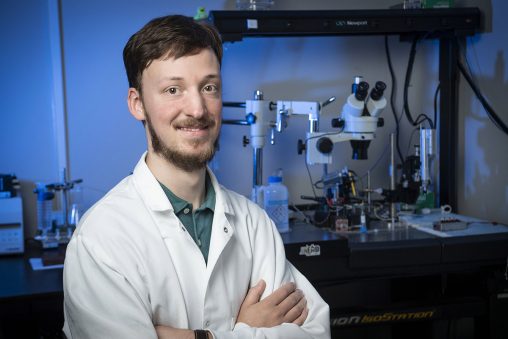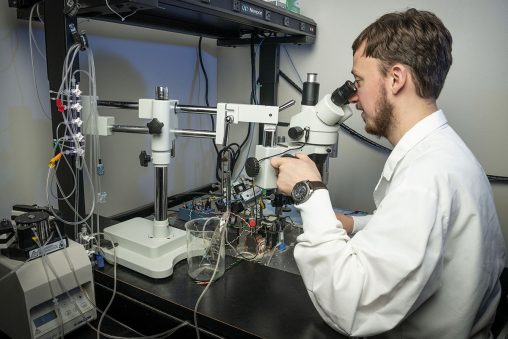
Andy Deutsch, a Wright State alum and current doctoral engineering student, received a three-year award from the National Institutes of Health to support his research of Amyotrophic Lateral Sclerosis, or ALS. (Photos by Erin Pence)
Andy Deutsch wants to run his own research lab, one based on the same rigorous standards he is learning as a doctoral engineering student at Wright State University.
A prestigious three-year award from the National Institutes of Health will allow Deutsch, a first-generation college student, to remain on that ambitious career path.
Deutsch, who is pursuing a Ph.D. in engineering at Wright State, is researching Amyotrophic Lateral Sclerosis (ALS), a fatal neurodegenerative disease that robs patients of the ability to move and breathe.
The Diversity Supplement Award he received is sponsored by the National Institutes of Health and is intended to improve the diversity of the research workforce by recruiting and supporting students and eligible investigators from diverse backgrounds, including those from groups underrepresented in the biomedical, behavioral, clinical and social sciences.
Deutsch is a research assistant in a lab directed by Sherif Elbasiouny, Ph.D., the Wright State University and Premier Health endowed chair in neurodegenerative diseases research; director of neuroengineering education and research; professor of neuroscience, cell biology and physiology; and professor in the Department of Biomedical, Industrial and Human Factors Engineering.
“Andy is one of the most determined students I’ve had the privilege to train. He approaches challenges fearlessly, and his experiments are among the most ambitious in our field,” Elbasiouny said. “The award from the NIH was granted for Andy’s outstanding caliber and the novelty of the proposed work.”
Deutsch is part of a group of researchers working with Elbasiouny examining how the neurons that control muscles degenerate in ALS patients.
Deutsch has identified an ion channel in the motoneurons of ALS patients that is dysfunctional and can cause muscle weakness. He is trying to uncover the underlying mechanistic properties of that ion channel and whether it interacts with other channels that are also impacted in ALS patients. Learning more about those interactions could help researchers learn more about what interrupts the function of neurons in ALS patients.
The exact cause of ALS remains unknown, and identifying its cause is critical to developing a cure and effective treatments to halt the progression of the disease.
“I’m highly motivated looking at neurodegenerative diseases altogether, and ALS is one that’s very devastating, and it’s very important that we put more resources toward it because it’s very under-studied overall,” Deutsch said.

Andy Deutsch’s goal is to get a faculty position at a university so he can start his own lab and investigate neurodegenerative diseases.
Deutsch grew up in Xenia and graduated from Xenia High School in 2016. Interested in engineering and science, he enrolled at Wright State to study biomedical engineering with a long-term goal of becoming a medical doctor.
As he approached graduation, Deutsch started evaluating his choices and whether medical school was the right route for him. When he considered his financial situation and interest in science, he realized he wanted to pursue a research career.
After graduating with his bachelor’s degree in biomedical engineering, he remained at Wright State to pursue a master’s degree in biomedical engineering and a Ph.D. in engineering.
Although he had not been exposed to laboratory research as an undergraduate student, Deutsch quickly found a place in Elbasiouny’s lab as a graduate student. He credits Elbasiouny for mentoring him.
“I came into this not knowing anything about research and I didn’t realize I didn’t know anything about research,” he said. “Dr. Elbasiouny helped me understand how it works and to set myself up in an academic way so I could continue down this path.”
Deutsch’s goal is to get a faculty position at a university so he can start his own lab and investigate neurodegenerative diseases. In addition to continuing his ALS research, he is interested in researching Alzheimer’s disease, frontal temporal dementia and neurodegenerative diseases that impact the brain and present as dementia.
“My goal is to set myself up to continue down this academic research path and investigate most neurodegenerative diseases in similar, very rigorous ways as we do here in this lab,” he said.

 Wright State student-athletes make a lasting impact on local family, more to come
Wright State student-athletes make a lasting impact on local family, more to come  Wright State names Rajneesh Suri dean of Raj Soin College of Business
Wright State names Rajneesh Suri dean of Raj Soin College of Business  ‘Only in New York,’ born at Wright State
‘Only in New York,’ born at Wright State  Wright State president, Horizon League leaders welcome new commissioner
Wright State president, Horizon League leaders welcome new commissioner  Wright State celebrates homecoming with week-long block party
Wright State celebrates homecoming with week-long block party 